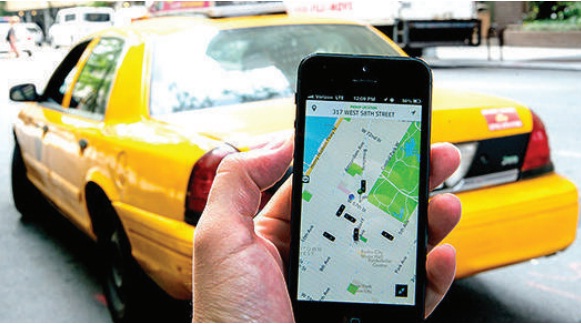Uber ready for Kampala
Local taxi operators brace themselves for entry of hi-tech cab operator

Uber, the US-based mobile app-based taxi service is getting set to open shop in Uganda. The company, which unveiled its services in neighboring Kenya last year, has advertised the positions of operations and logistics manager and operations coordinator for Kampala, an indication of its intent to make Kampala the tenth city to operate in on the continent.
Samantha Wallenberg, the communications associate for Uber in Africa, confirmed to the The Independent in an email on May 13 that they will soon set up operations in Uganda.
“We want to be in any progressive, forward-thinking city that has a need for safe, reliable and efficient transportation,” she said. The US tech firm has not been well received in some countries but it plans to roll out its service in Kampala in partnership with the existing cab operators.
Wallenberg, however, said the date for launching the firm in the country will be communicated later once the positions are filled.
The company is also looking at extending its service in Tanzania and Ghana this year. The planned entry of Uber into Uganda’s transport sector comes nearly two years since a similar service-SafeBoda- was unveiled in Kampala for motorcycle taxis.
Across in Kenya, Uber says it has already signed up to nearly 1,000 drivers to its platform since it began operations in January 2015.
Uber is also preparing to launch in Dar es Salaam, Tanzania; and Accra, Ghana, in the coming months.
So, how will the existing taxi/cab businesses deal with the new competitor? Uganda’s cab operators say they welcome the taxcalling service citing convenience and efficiency in the taxicab’s industry.
Mark Karamira, the co-founder and CEO of Spe Taxi Cab, told The Independent that the entry of Uber in the country could help streamline the industry.
He says the service would enable clients and cab operators to easily locate each other and thus ease their movement unlike in the current situation where clients have to move long distances looking for them on the streets.
“At the current state, a cab operator might park his car on the street for a whole day without getting a client yet he could easily be linked up to the clients with the help of technology,” Karamira says. “We believe Uber and the cab operators will benefit from the partnership to grow the business.”
Across in Kenya, Uber says it has already signed up to nearly 1,000 drivers to its platform since it began operations in January 2015. Uber is also preparing to launch in Dar es Salaam, Tanzania; and Accra, Ghana, in the coming months.
He says though the cab operators on Uber may charge lower fares compared to the traditional cabs, they will be able to make more trips and thus more returns compared with their regular counterparts. Karamira’s views are shared by Brian Barahukwa, a director at Silver Fleet, who says Uber will ease linking up clients to the cabs, thus enhancing efficiency in their operations.
With the entry of Uber, passengers intending to use drivers linked onto their system will be required to download an app and sign up. Subsequently, they will book the cab- with location pinpointed with the Global Positioning System (GPS) on the device, choose the kind of the car needed, check the estimated price of the journey, and told the time the cab would arrive.
Uber customers are charged a fare based on the distance covered and time taken to reach the destination unlike the regular cab drivers who quote prices based on personal negotiations. For that, Uber cabs have tended to charge its customers relatively lower fares compared with the traditional taxi operators, and thus gaining more popularity.
This has triggered bitter rivalry and street demonstrations between local taxi operators and Uber drivers for a while in a number of countries including some parts of Europe, Kenya, and South Africa. Some countries even banned Uber altogether. For instance, Uber was banned to operate in Spain, New Zealand, Netherlands, Brazil, Italy and Germany last year, on claim that it created unfair competition with the traditional cab operators. In South Korea, nearly 30 people linked to the company, including chief executive Travis Kalanick were charged with running an illegal taxi firm.
Phillip Cardenas, the head of global safety at Uber and a former US military official says every ride is traced by GPS, making it easy for the firm to work with public safety officials and ensure that travelers are protected. “Our technology includes a two-way rating system to help ensure only the top drivers stay on the platform and riders are also held accountable,” Cardenas said. Also, Uber’s app displays a driver’s photo, license plate number, and vehicle type, giving riders an opportunity to confirm the authenticity of the vehicle before taking the ride.
The officials said the taxi firm is committed to developing new technology tools that will improve safety, strengthen, and increase the number of cities and countries where background checks are conducted and improve communication with local officials and law enforcement agencies.
In Africa, Uber operates in cities across the continent straddling from Johannesburg to Nairobi, Cairo to Lagos among others. Globally, it operates in 60 countries and 444 cities- including all major cities in the US. At the moment, Uber is estimated to be worth $62 billion, making it one of the fastest growing start-ups in the world.
 The Independent Uganda: You get the Truth we Pay the Price
The Independent Uganda: You get the Truth we Pay the Price


